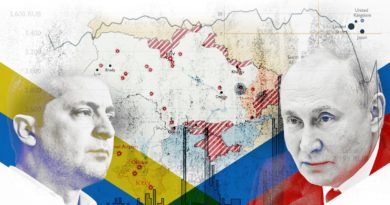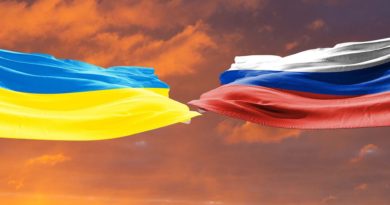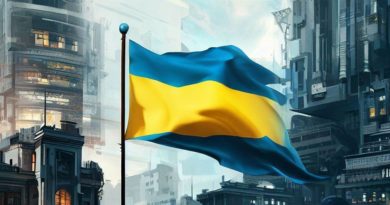We’re Playing Russian Roulette: John Mearsheimer

Until the Russia-Ukraine crisis, Professor John Mearsheimer was mainly known in academic circles as a leading scholar in the “realist” school of foreign policy. That is to say, he takes an unsentimental view of world affairs as being a muscular competition between great powers for regional hegemony.
But with the Ukrainian “Maidan revolution” in 2014 and then the Russian invasion this February, he became a figurehead for the millions of people worldwide who have misgivings about the wisdom of Western actions in Ukraine. A single lecture delivered in 2015 entitled “Why is Ukraine the West’s fault” has been viewed a staggering 28 million times on YouTube.
His central argument, that by expanding Nato eastwards and inviting Ukraine to join the bloc, the West (and in particular the United States) created an intolerable situation for Vladimir Putin which would inevitably result in Russia taking action to “wreck” Ukraine, is politically unsayable today. His critics denounce him as a Putin apologist; his supporters, however, believe the invasion was proof that he was right all along.
[embedded content]
When I meet Mearsheimer, I am keen to focus on what we have learned since the February invasion began. I want to know how can he still maintain that there is “no evidence” that Russia had ambitions to conquer Ukraine? How else are we to interpret that shocking moment when it became clear that the Russians were launching a full-scale invasion — from the North, the South and the East of the country?
“The Russians invaded Ukraine with 190,000 troops at the very most,” he replies. “They made no effort to conquer all of Ukraine. They didn’t even come close. There is no way they could have conquered Ukraine with 190,000 troops. And they didn’t have the troops in reserve to do that. When the Germans invaded Poland, in 1939, they invaded with 1.5 million troops. That’s the size army you need to conquer a country like Ukraine, occupy it and then incorporate it into a greater Russia. You need a massive army. This was a limited aim strategy.”
In which case, what was that limited aim?
“What the Russians have said they have wanted from the beginning is a neutral Ukraine. And if they can’t get a neutral Ukraine, what they’re going to do is create a dysfunctional rump state… They’ve taken a huge swath of territory in the East, they’ve annexed those oblasts that are now part of Russia. And at the same time, they’re destroying Ukrainian infrastructure. They’re wrecking the Ukrainian economy. It’s sickening to see what’s happening to Ukraine.”
This assessment of the situation on the ground is very different from the reports we hear every day of Ukrainian successes and Russian retreats. The underdog nation, by most accounts, is performing astonishingly well against the aggressor.
Mearsheimer concedes that he was surprised by how poorly the Russians have performed, but that doesn’t seem to have affected his assessment of the realpolitik. I put it to him that the progress of the Ukraine war thus far can be seen as a repudiation of his “realist” theory of international affairs. The smaller power is outperforming the greater, in part through the sheer moral conviction of its people defending their homeland — evidence, surely, of the intangible moral element that is missing from his coldly “realist” world view?
“The key word here is nationalism,” he responds. “There’s no doubt that when the Russians invaded Ukraine, nationalism came racing to the fore, and that Ukrainian nationalism is a force multiplier. There’s also no doubt that nationalism is not part of the realist theory of international politics that I have, but nationalism is consistent with realism. Nationalism and Realism fit together rather neatly. But the point you want to remember is that Nationalism is also at play on the Russian side. And the more time goes by, and the more the Russians feel that the West has its gun sights on Russia, and is trying to not only defeat Russia, but knock Russia out of the ranks of the great powers, the more Russian nationalism will kick in. You want to be very careful not to judge the outcome of this war at this particular juncture. This war has got a long time to go and it’s going to play itself out in ways that are hard to predict. But I think there is a good chance that in the end, the Russians will prevail.”
Bleakly, Mearsheimer now believes that the opportunity for peace has been lost, and that there is no realistic deal that could be reached in Ukraine. Russia will not surrender the gains made in Eastern Ukraine, while the West cannot tolerate their continued occupation; meanwhile, a neutral Ukraine is also impossible, as the only power capable of guaranteeing that neutrality is the US, which would of course be intolerable to Russia. As he puts it, succinctly:
“There are no realistic options. We’re screwed.”
He believes that escalation is likely, and the chance of a nuclear event is “non-trivial”. He lays out his rationale for why the Russians might well go there, step by step:
“If the Russians were to use nuclear weapons, the most likely scenario is that they would use them in Ukraine. And Ukraine does not have nuclear weapons of its own. So the Ukrainians would not be able to retaliate against the Russians with their own nuclear weapons. So that weakens deterrence. Furthermore, if the Russians use nuclear weapons in Ukraine, the West, and here we’re talking mainly about the United States, is not going to retaliate with nuclear weapons against Russia, because that would lead to a general thermonuclear war.”
Western restraint cannot be relied upon in this scenario, he concedes, and the chances of catastrophic escalation remain strong, which is why he considers the current rhetoric among Western leaders about defeating Russia “foolish”.
The British are “major cheerleaders” for the policy, by his assessment, pushing the United States into stronger action. “I think the British are being remarkably foolish, just like I think, the Poles, the Baltic states, and the Americans.”
Sweden and Finland meanwhile, with their Nato membership bids, are only making the situation more dangerous. The idea that Russia is poised to invade either Finland or Sweden is a “figment of the West’s imagination” and their membership of the security pact will only heighten Russia’s sense that it is being deliberately encircled. He believes their applications should be rejected, and that nobody should have the “right” to join a security pact like Nato.
Mearsheimer’s logic all points in the same direction: if there is no peace deal now possible in Ukraine, the only logical outcome is ongoing fighting; ongoing fighting will logically lead to escalation, particularly if Russia appears to be losing; and escalation may very well eventually take a nuclear form, at which point a great power nuclear conflict becomes a real possibility.
A more positive eventual outcome than this, of course, will falsify his theory and prove him wrong. I ask him, if the Ukraine conflict ends less badly — perhaps with Russia withdrawing or accepting a fudge, Ukraine strengthened and no nuclear event — will he admit he was wrong?
“Of course,” he says. “International Politics operates in a world of what I would call radical uncertainty, it’s very hard to figure out what the future looks like, it’s very hard to make predictions… Is there a possibility that the Russians will cave at some point? I think there’s a small possibility. I also think there’s a non-trivial chance that this will lead to nuclear war. And when you marry the consequences of nuclear war with the possibility, in my mind, that means you should be remarkably cautious. Let me illustrate this by this analogy. If I have a gun, and the barrel has 100 chambers, and I put five bullets in that barrel. And I say to you, Freddie, I’m gonna pull the trigger and put the gun up to your head. But don’t worry, there’s only a 5% chance that I will kill you… The question you have to ask yourself is, are you going to be nervous? Are you going to be scared stiff? …The consequences here involve nuclear war. So there only has to be a small probability that John is right.”
The common critique of this line of argument is that it becomes hard to see how the behaviour of a nuclear power could ever be curtailed. The bully could always wield the threat of nuclear disaster to get away with a new atrocity. And that logic also leads to disaster. So where would Mearsheimer draw the line? His answers are unambiguous.
First, he believes without hesitation that the existing Nato countries must be defended, notwithstanding the risks.
“The Baltic states are in Nato. Poland and Romania are in Nato. They have an article 5 guarantee. If the Russians were to attack those countries, we would have to come to the defence of those countries, there’s no question about that. I would support that.”
More surprisingly, on the subject of China and Taiwain, which you might think bears a resemblance to Russia and Ukraine as a smaller Western-backed entity in the orbit of a rival regional hegemon, he takes the opposite view.
“I have a fundamentally different view on China than I do on Russia. And therefore, my thinking about Taiwan is different from my thinking about Ukraine. I believe that China is a peer competitor of the United States, and that it threatens to dominate Asia the way the United States dominates the Western Hemisphere. … From an American point of view, that’s unacceptable. And I think that’s correct. I think the United States should not want China to dominate Asia, the way we dominate the western hemisphere. So we’re going to go to great lengths to contain China. And for purposes of containing China, it is important for us to defend Taiwan.”
Mearsheimerism, then, is not quite what either his followers or his detractors might think it is. It is not an anti-war doctrine (his branch of “Offensive Realism” specifically sees aggression as a necessary part of great powers’ survival); nor is it fundamentally sceptical of American power. He supports American power being projected in its interests, but believes that the war in Ukraine is a distraction from the real threat, which is China, and worse, will drive Russia into the arms of China when it is in America’s interests to drive them apart.
A week before we met, Isaac Chotiner published a transcript of a telephone interview with Mearsheimer in the New Yorker. It was ostensibly about Ukraine, but Chotiner pushed Mearsheimer to talk about his recent meeting with Viktor Orbán. Which he refused to do. The effect was to imply that he was covering up murky friendships in the illiberal (and Russia-sympathetic) fringes of Europe.
Mearsheimer tells me, which he refused to do on the phone to Chontiner, that he was in Hungary to promote the translation of his latest book The Great Delusion, and that the prime minister and president requested a meeting via the publisher. He says he jumped at the chance, and ended up having a three-hour conversation with Orbán.
“I was very interested in talking to him for two reasons. One, I was interested in hearing his views on Ukraine, and how his views compare to the views of other European leaders and where he thought this was all headed. But I was also very interested in talking to him about nationalism and liberalism, the relationship between those two isms, this is one of the central themes in my book. What I have in common with Orbán is he thinks nationalism is a very important force, obviously, and I agree with him. But where I disagree with him is I think that liberalism is a very powerful force, and it’s all for the good. He, on the other hand, detests liberalism, so what he sees is liberalism and nationalism as polar opposites, and he favours nationalism, and wants to crush liberalism. I, on the other hand, see nationalism and liberalism as two ideologies that differ in important ways, but nevertheless, can coexist.”
Is he not worried that, whatever the content, by having those kinds of meetings, he will start to be seen as an activist with a political agenda more than an observer and an analyst?
“I’m not an activist, I’m an academic, I’m a scholar. And this is part of my research. My goal is to understand what’s going on in Europe… I’m not condoning Victor Orbán’s policies, or condemning them, I’m simply talking to him to understand what is going on in his mind and what is going on in Hungary and what is going on in Europe more generally… The fact that people are trying to smear me because I talked to Viktor Orbán is hardly surprising in the context that we now operate, because people are really not that interested these days in talking about facts and logic. What they prefer to do is to smear people who they disagree with.”
It is perhaps not surprising that Mearsheimer’s brand of cold realism has become popular in our increasingly multipolar, competitive world. But there is an impassive, observational quality to it which sounds negative and even cynical to the progressive ear. I ask him whether this uncertain, multipolar world is here to stay and if so, is that a good thing?
“I think it’s definitely here to stay. And I think it’s more dangerous than the Cold War was. I was born and raised during the Cold War, and the world was bipolar at that point in time… During the Cold War, we had the United States and the Soviet Union. During the Unipolar Moment, you just had the sole pole, the United States. And today, you have three great powers, the United States, China, and Russia. Now, you could not have great power politics in the unipolar world, because there was only one great power. What we have today, with the US-China competition in East Asia, and the US-Russia competition, mainly over Ukraine, is two conflict dyads. They’re separate conflict dyads — US-China, US-Russia. I would argue that not only do you have two instead of one, each one of those dyads is more dangerous than the conflict dyad in the Cold War.
“The United States and Russia are almost at war in Ukraine, and we can hypothesise plausible scenarios where the United States ends up fighting against Russia in Ukraine. And then we talked about the US-China competition and the problems associated with Taiwan. And Taiwan is not the only flashpoint in East Asia, there’s also the South China Sea, the East China Sea, and the Korean peninsula. So you can imagine a war breaking out between the United States and China in East Asia, and a war breaking out in Ukraine involving the United States and Russia, I think more easily than you could imagine a war breaking out during the Cold War in Europe, or in East Asia involving the United States and the Soviet Union.
So I think we live in more dangerous times today than we did during the Cold War, and certainly than we did during the Unipolar Moment. And I think if anything, this situation is only going to get worse.”
I really hope you’re wrong, I say.
“I hope I’m wrong too,” he replies.
*
Note to readers: Please click the share buttons above. Follow us on Instagram and Twitter and subscribe to our Telegram Channel. Feel free to repost and share widely Global Research articles.
Freddie Sayers is the Executive Editor of UnHerd. He was previously Editor-in-Chief of YouGov, and founder of PoliticsHome.
Featured image is from Mediaite


